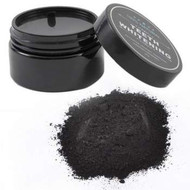Charcoal Powder For Teeth Whitening: Fact or Fallacy
Posted by Patrick Edouard on 31st Oct 2019
Teeth whitening is a concept that is trending presently; as there are so many folks who are vying to have their teeth whitened one way or the other, due to the accumulated dirt and stains from foods, medications (especially tetracycline), fruits (cherries, blueberries, and pomegranates), candies, coffee, cigarettes and red wine, which has made their teeth become discolored.
The above-mentioned factors are not the sole causes of teeth discoloration; other factors such as age, injuries, trauma, genetics, poor hygiene, braces removal, diseases, and excess fluoride are reasons why people’s teeth become stained and discolored.
The desire to have a gleaming and sparkling set of teeth is the reason why people go through so many teeth whitening procedures and products.
Teeth Whitening: An Overview.
Teeth whitening is a process through which discolored teeth are made to become whiter intrinsically and extrinsically, through the use of chemicals and other technological means such as hydrogen peroxide and hydrogen peroxide-infused products, whitening pens, whitening strips, whitening gels, laser whitening, whitening mouth rinses, whitening trays, and electric stain removal toothpaste.
Types Of Teeth Whitening
Teeth whitening comes in two different forms, and they are;
* Intrinsic teeth whitening
This form of teeth whitening entails that the inner part of each tooth is whitened. During intrinsic teeth whitening, free radicals are produced inside the teeth, and these free radicals help to decrease the pigment molecules and also reduce the darkness of the pigment in the teeth.
The teeth get dehydrated after this form of whitening and get rehydrated subsequently after a few days of eating and drinking.
* Extrinsic teeth whitening
This form of teeth whitening entails the whitening of the outer part of the teeth, which is the enamel of the teeth.
Asides from the above-mentioned teeth whitening methods, there are some other natural teeth whitening methods such as baking soda, coconut oil, apple vinegar, banana peels, and charcoal powder.
Of all the whitening methods known, the charcoal powder method is the most controversial of them all; as there are speculations about the safety of the charcoal powder on the teeth; and if it actually does work for whitening teeth.
Facts About The Charcoal Powder Used For Teeth Whitening
The Charcoal Powder used to whiten the teeth is quite different from the conventional charcoal used for grilling.
The conventional charcoal used for grilling is designed to be a fuel and because it emits carbon dioxide when it is heated; it is very dangerous to the body; as it can cause excessive vomiting, tiredness, coma, convulsion, restlessness, heightened blood pressure and asphyxia among other adverse effects to the body.
On the other hand, the charcoal powder used for whitening teeth, used for face masks/scrubs and for medications, is a smooth and fine black powdery substance which is made from a mixture of different objects such as coconut shell, peat, coal, bone char, sawdust and woods; which have been processed under extreme heat; in a bid to rid the combo of harmful substances, energize it, make it permeable for air to pass through it and ultimately make it potent enough to heal the body, whiten the teeth and also freshen oral breath.
Activated Charcoal Powder And Its Teeth Whitening Properties
As a result of its medicinal components, charcoal powder has the power to magnet and extract toxins from the body; and also magnet and extract dirt and stains from the teeth; hereby making the teeth lighter in the process.
How To Use The Charcoal Powder For Teeth Whitening
Charcoal powder can either be used in its natural form as a powder or be used via charcoal powder infused products such as toothpaste.
Caveats To Note Using Charcoal Powder For Teeth Whitening.
Although the charcoal powder is effective for teeth whitening; it is essential to note that the use of charcoal-infused products shouldn't be an everyday affair; this is because of the abrasive nature of the charcoal powder, which can cause the dentin and enamel to wear out.
Also, the use of charcoal-infused toothpaste should be minimized, to avoid the accumulation of charcoal particles in the cracks of the teeth.
In conclusion, charcoal-infused toothpaste can also cause sensitivity of the gum and teeth, if applied to the teeth excessively.
Hence, the application of charcoal-infused toothpaste on the teeth and gum should be for a little time, after which you can then make the switch back to normal toothpaste when you have achieved whiter teeth.
The chemical/technological teeth whitening methods are not a one cap fits all, as all these methods don't work for all teeth.
Hence, you must know what works for your teeth; to avoid a situation whereby during the process of whitening, you get to expose your teeth and gum to more harm when you go for a method that has adverse effects on your teeth and gum.
Therefore, to be on the safe side, it is better to go the charcoal powder method, which is not the only natural but is made up of known substances that are not harmful to the body in any way.

